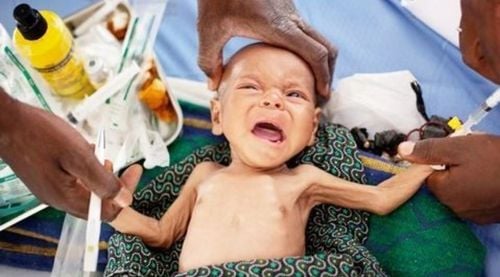This is an automatically translated article.
The article was professionally consulted by Dr., Doctor Phan Nguyen Thanh Binh - Head of the Department of Nutrition - Dietetics - Department of Pediatrics - Neonatology, Vinmec Central Park International General Hospital.Malnutrition due to lack of energy protein is an important issue for improving the health of children in developing countries and in Vietnam today. This is a pathological condition under the influence of infection, which occurs when the diet is poor in protein and energy for a long time, leading to the retardation of the physical and mental development of the child.
1. Is malnutrition due to lack of energy protein dangerous?
Malnutrition due to protein-energy deficiency is a very common condition among children in developing countries.This condition is the leading cause of death in children: According to WHO (September 1980), each year in third world countries, there are 10.4 million children under 11 months of age and 4.4 million children under 11 months of age. million children aged 1-4 years old die of which 57 % are due to malnutrition Protein energy (the remaining 43 % are due to infections, mainly diarrhea), that is 25 children < 5 years old every minute died from malnutrition.
Malnutrition due to protein-energy deficiency makes children more susceptible to infections and, when infected, worsens, increasing mortality.
Malnutrition makes children underdeveloped physically and mentally. The effects of malnutrition are more severe if the disease occurs when the organs are immature, before the age of 6 for the brain and before the age of 20 for the height. The degree of growth retardation increases in parallel with the duration of the disease most at the stage of the child with the highest growth rate. Intelligence is easily affected if the child is malnourished in the fetus and at the age of < 12 months, low height if the disease appears before the age of 20 and persists for many months and years.
2. Consequences of malnutrition due to lack of energy protein
Malnourished children show signs of retardation in physical and intellectual development: They are too short, too thin for their age, physically weak, and do not study well. The consequences of malnutrition are often irreversible, with young children it will affect health and growth, when growing up, it will affect the ability to study and work physically and mentally as well as a number of diseases. chronic in adulthood. If the disease is not detected and taken timely measures, it can cause many unpredictable consequences such as:Physically Nutritional deficiency directly affects all organ systems of the body to reduce development. , including the musculoskeletal system, limiting the height of children.
Besides, many studies also show that children with malnutrition, stunting are at high risk of being attacked repeatedly and repeatedly by bacterial infections, even potentially dying from diseases. serious illness such as diarrhea, pneumonia, measles.
Adults who were stunted as children are more prone to diseases such as: High blood pressure, diabetes, heart disease and obesity.
Mentally stunted malnourished children tend to change their socio-emotional behaviors such as being lethargic, fussy, uninterested in fun activities and exploring life.
This not only limits the child's interaction with people and the world around, but also makes the child lose the ability to learn.
According to UNICEF, mental retardation due to early childhood malnutrition causes children to go to school later, lose 70% of their grades, and reduce their ability to learn for life by 22-45%.

Suy dinh dưỡng là hậu quả của suy dinh dưỡng do thiếu protein năng lượng.
According to World Bank estimates, every 1% decrease in height corresponds to 1.4% of that individual's productivity, and malnourished, stunted children as adults earn less than 20 % compared to those who were not malnourished in childhood.
Malnutrition in children often leaves severe consequences. Recently, there is a lot of evidence that malnutrition in early stages, especially in the fetal period, is associated with all stages of life. The consequences of malnutrition can last for generations. Women who were malnourished during childhood or adolescence to adulthood become malnourished mothers. At this time, malnourished mothers are more likely to give birth to weak babies with low birth weight. Most babies with low birth weight will be malnourished (underweight or stunted) within the first year of life. These children have a higher risk of death than normal children and are less likely to develop normally.
3. Prevention of malnutrition
It is because of the serious consequences that malnutrition causes that prevention is important. Measures to prevent malnutrition include:Nutrition and health care for pregnant and lactating mothers. Manage pregnancy well and take care of mothers after giving birth. Routine antenatal check-ups to monitor fetal growth. Eat enough in both quantity and quality during pregnancy. Breastfeed exclusively for the first 6 months, and for up to 18-24 months, at least 12 months. Feed your baby on demand, not on a rigid schedule. Implement supplementary food (weaning, eating sam) reasonably. Ensure adequate vitamin A supplementation for children and mothers after birth. Hygiene care and prevention of worm infections. Organization of nutrition education and counseling in the community and at families, monitoring growth charts.

Cách phòng tránh suy dinh dưỡng là đảm bảo bổ sung đầy đủ vitamin A cho trẻ em và bà mẹ sau sinh.
The article references the source: Vietnam National Institute of Nutrition.














